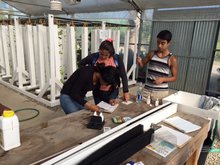0
Report
Community:
Jun 29, 2022
Looking largely at the 2020-2021 school year, the report is chock-full of information about how schools apply research-based strategies in a variety of different contexts – from very different school systems across multiple states – to make research translate into positive experiences and outcomes for students and their teachers in three critical areas:
• Instructional work, where math or English-language-arts teams, including instructional coaches, special-education teachers, and English learner/multilingual teachers, work to improve the quality of instruction within classrooms.
• Early Warning and Response strategies, where grade-level or cross-functional teams work to create more supportive school environments, where young people are connected to adults, each other, and the school community.
• Well-Matched Postsecondary initiatives, where school-based teams of counselors, service providers, district and school leaders, teachers, and other staff band together to implement evidence-based strategies and processes that support postsecondary application, enrollment, and persistence.
At its heart, improvement is about learning. Each of these networks study their own work, and consistently and strategically make adaptations to increase their effectiveness as the organizational hub supporting schools. And they demonstrate how lessons need not fade away, but when codified, systematized, and shared, they can deepen our collective capacity to accelerate the field’s learning and growth.
Authored by:
Topics: Advocacy, Attendance, Child welfare, CLPHA, Community development, Education, Grade-level proficiency, Housing, Literacy, Low-income, Partnerships, Place-based, Supportive housing, Sustainability, Youth
 Shared by Karina George
Shared by Karina George
Karina George posted a
on Jun 29, 2022
Looking largely at the 2020-2021 school year, the report is chock-full of information about how schools apply research-based strategies in a variety of different contexts – from very different school systems across multiple states – to make research translate into positive experiences and outcomes f
0
Video
Community:
May 18, 2021
Keynote: Michael Bennet (D-Co), Congressional Video Message.
Plenary: Reducing Childhood Poverty.
Following Housing Is' 2019 Summit discussion of reducing childhood poverty and the idea of a university child allowance, this panel will explore the renewed discussion of legislation around a child tax credit and the idea of a universal basic income.
Authored by: CLPHA
Topics: Child welfare, Community development, Housing, Legislation & Policy, Low-income, Racial inequalities, Youth
 Shared by Housing Is
Shared by Housing Is
Housing Is posted a
on May 18, 2021
Keynote: Michael Bennet (D-Co), Congressional Video Message.
Plenary: Reducing Childhood Poverty.
Following Housing Is' 2019 Summit discussion of reducing childhood poverty and the idea of a university child allowance, this panel will explore the renewed discussion of legislation around a c
0
Report
Community: Youth
Nov 3, 2020
As housing costs have escalated and inequities persist across the country, many young people need flexible, empowerment-based investments to get stably housed and onto a path to thriving. To this end, direct financial assistance (“cash transfers”) with other supports offer a promising solution grounded in a robust global evidence base. The circumstances of COVID-19 amplify the importance of developing and evaluating youth-informed approaches to doing things differently.
This report shares results and implications of a year-long research and stakeholder engagement process that Chapin Hall conducted in collaboration with Point Source Youth to inform the development of a Direct Cash Transfer Program (DCTP) for youth experiencing homelessness. We look forward to piloting and rigorously evaluating a program based on these findings, starting in NYC.
Authored by: Matthew Morton for CHAPIN HALL AT THE UNIVERSITY OF CHICAGO
Topics: Community development, Funding, Homelessness, Housing, Low-income, Youth
 Shared by Housing Is
Shared by Housing Is
Housing Is posted a
on Nov 3, 2020
Matthew Morton for CHAPIN HALL AT THE UNIVERSITY OF CHICAGO
As housing costs have escalated and inequities persist across the country, many young people need flexible, empowerment-based investments to get stably housed and onto a path to thriving.
0
Report
Community:
Jun 6, 2019
Trends in Housing Assistance and Who it Serves
Authored by: PAHRC
Topics: Community development, Disabilities, Education, Funding, Health, Homelessness, Housing, Legislation & Policy, Low-income, Partnerships, Research, Seniors, Workforce development, Youth
 Shared by Keely Stater
Shared by Keely Stater
Keely Stater posted a
on Sep 10, 2019
Trends in Housing Assistance and Who it Serves
0
Publication
Community:
Mar 26, 2019
As Wilmington’s Riverside community embarks on an extraordinary revitalization effort, Christiana Care Health System is making an impact on health with a $1 million gift to REACH Riverside Development Corporation that will support community health and youth development programs.
Authored by: Christiana Care News
Topics: Community development, Health, Housing, Low-income, Youth
 Shared by Housing Is
Shared by Housing Is
Housing Is posted a
on Apr 4, 2019
As Wilmington’s Riverside community embarks on an extraordinary revitalization effort, Christiana Care Health System is making an impact on health with a $1 million gift to REACH Riverside Development Corporation that will support community health and youth development programs.
1
News Article
Community:
Jun 11, 2018
At a recent public meeting, Sandra Lee Fewer, a member of the city’s Board of Supervisors, asked acting librarian Michael Lambert to explore whether future library renovations might include affordable housing. Fewer hopes to leverage existing public land to create multi-story facilities that include both libraries and housing.
Authored by: Steve Dubb for NPQ
Topics: Community development, Homelessness, Housing, Literacy, Low-income, Partnerships, Place-based, Research, Youth
 Shared by Housing Is
Shared by Housing Is
Housing Is posted a
on Jan 29, 2019
At a recent public meeting, Sandra Lee Fewer, a member of the city’s Board of Supervisors, asked acting librarian Michael Lambert to explore whether future library renovations might include affordable housing.
0
Publication
Community:
Jan 24, 2019
Affordable housing campaigns are not new, of course, but what is unprecedented and transformative about Opportunity Starts at Home is the scope and diversity of the partners that are joining forces to advocate for more robust and equitable federal housing policies. The campaign is advised by a Steering Committee including leading national organizations representing a wide range of interests that are working shoulder-to-shoulder to solve the affordable housing crisis.
Authored by: Opportunity Starts at Home
Topics: Asset building, Child welfare, CLPHA, Community development, Early childhood, Education, Food insecurity, Funding, Health, Homelessness, Housing, Immigrants, Legislation & Policy, Low-income, Mobility, Out-of-school time, Partnerships, Racial inequalities, Safety, Seniors, Stability, Substance abuse, Youth
 Shared by Mica O'Brien
Shared by Mica O'Brien
Mica O'Brien posted a
on Jan 24, 2019
Opportunity Starts at Home
Affordable housing campaigns are not new, of course, but what is unprecedented and transformative about Opportunity Starts at Home is the scope and diversity of the partners that are joining forces to advocate for more robust and equitable federal housing policies.
0
News Article
Community:
Jan 10, 2019
Island School is one of 247 “community schools” in New York. These are regular public schools, with a twist. They have longer days and longer school years: Island stays open 12 hours a day, six days a week, including spring and winter breaks as well as the summer. A psychologist makes weekly rounds. A dentist comes by regularly. So does an optometrist, and students who need glasses get them free.
Authored by: David L. Kirk for The New York Times
Topics: Community development, Dual-generation, East Coast, Education, Family engagement, Homelessness, Housing, Low-income, Mental health, Metrics, Partnerships, Stability, Youth
 Shared by Mica O'Brien
Shared by Mica O'Brien
Mica O'Brien posted a
on Jan 10, 2019
David L. Kirk for The New York Times
Island School is one of 247 “community schools” in New York. These are regular public schools, with a twist. They have longer days and longer school years: Island stays open 12 hours a day, six days a week, including spring and winter breaks as well as the summer.
0
Research
Community:
Dec 5, 2018
How does the quality of where we live affect our children’s development? The impact of housing and neighborhood quality on physical health has long been studied in the public health field, but studies that aim to assess those same impacts on mental health are less common. This study examined the relationship between the physical quality of housing and neighborhoods and their interactive effect on the mental health and motivation of children from elementary school through young adulthood.
Authored by: Journal of Environmental Psychology
Topics: Child welfare, Community development, Housing, Low-income, Mental health, Racial inequalities, Research, Youth
 Shared by Mica O'Brien
Shared by Mica O'Brien
Mica O'Brien posted a
on Dec 6, 2018
Journal of Environmental Psychology
How does the quality of where we live affect our children’s development? The impact of housing and neighborhood quality on physical health has long been studied in the public health field, but studies that aim to assess those same impacts on mental health are less common.
0
Research
Community:
Nov 28, 2018
Research shows that the racial composition of the public school student population has changed substantially over the past 25 years, but student racial sorting among schools has remained relatively stable. A growing body of research shows that school segregation matters for the educational and socioeconomic outcomes of students of color. To fix it, however, we have to understand why racial segregation has persisted.
Authored by: The Urban Institute
Topics: Community development, Education, Low-income, Racial inequalities, Research, Youth
 Shared by Mica O'Brien
Shared by Mica O'Brien
Mica O'Brien posted a
on Dec 6, 2018
Research shows that the racial composition of the public school student population has changed substantially over the past 25 years, but student racial sorting among schools has remained relatively stable.
0
News Article
Community:
Sep 24, 2018
The Housing Authority of the County of Los Angeles (Calif.) developed an innovative community garden to provide access to affordable and fresh food as well as skills training and job opportunities.
Authored by: Ashanti Wright for Journal of Housing & Community Development
Topics: Community development, Food insecurity, Green, Health, Housing, Low-income, Nutrition, Place-based, Sustainability, Youth
 Shared by Mica O'Brien
Shared by Mica O'Brien
Mica O'Brien posted a
on Oct 30, 2018
Ashanti Wright for Journal of Housing & Community Development
The Housing Authority of the County of Los Angeles (Calif.) developed an innovative community garden to provide access to affordable and fresh food as well as skills training and job opportunities.
0
Report
Community:
Oct 24, 2018
CLPHA’s Housing Is Initiative is engaged in a number of cross-sector activities focused on developing partnerships, facilitating a community of practice, resource development, promoting best practices, online collaboration, policy and advocacy, and training and education. Read about recent activities in this Fall Update.
Authored by:
Topics: Child welfare, CLPHA, Community development, Cost effectiveness, Data sharing, Early childhood, Education, Family engagement, Funding, Health, Homelessness, Housing, Low-income, Medicaid / Medicare, Mental health, Partnerships, Place-based, Post-secondary, Research, Stability, Substance abuse, Workforce development, Youth
 Shared by Mica O'Brien
Shared by Mica O'Brien
Mica O'Brien posted a
on Oct 24, 2018
CLPHA’s Housing Is Initiative is engaged in a number of cross-sector activities focused on developing partnerships, facilitating a community of practice, resource development, promoting best practices, online collaboration, policy and advocacy, and training and education.
0
News Article
Community:
Oct 9, 2018
Sweet Water Foundation transformed four blocks in Englewood to cultivate community and help build skills, resources, and opportunities for residents.
Authored by: MacArthur Foundation
Topics: Community development, Family engagement, Food insecurity, Green, Health, Low-income, Midwest, Nutrition, Partnerships, Place-based, Sustainability, Youth
 Shared by Mica O'Brien
Shared by Mica O'Brien
Mica O'Brien posted a
on Oct 24, 2018
Sweet Water Foundation transformed four blocks in Englewood to cultivate community and help build skills, resources, and opportunities for residents.
0
Podcast
Community:
Sep 12, 2018
Opportunity Zones have the potential to make a huge economic impact on disinvested communities across the country. Host Justin Milner speaks with researchers Brett Theodos and Brady Meixell on how this brand-new economic development initiative works, and how we’ll know if it’s truly successful.
Authored by: Urban Institute's Critical Value Podcast
Topics: Community development, Low-income, Mobility, Youth
 Shared by Mica O'Brien
Shared by Mica O'Brien
Mica O'Brien posted a
on Oct 10, 2018
Urban Institute's Critical Value Podcast
Opportunity Zones have the potential to make a huge economic impact on disinvested communities across the country. Host Justin Milner speaks with researchers Brett Theodos and Brady Meixell on how this brand-new economic development initiative works, and how we’ll know if it’s truly successful.
0
News Article
Community:
Oct 1, 2018
Some places lift children out of poverty. Others trap them there. Now cities are trying to do something about the difference.
Authored by: Emily Badger and Quoctrung Bui for The New York Times
Topics: Child welfare, CLPHA, Community development, Criminal justice, Housing, Low-income, Metrics, Mobility, Racial inequalities, Research, Stability, Youth
 Shared by Mica O'Brien
Shared by Mica O'Brien
Mica O'Brien posted a
on Oct 1, 2018
Emily Badger and Quoctrung Bui for The New York Times
Some places lift children out of poverty. Others trap them there. Now cities are trying to do something about the difference.
0
News Article
Community:
May 25, 2018
Community organizations are improving health equity by tackling the cycle of poverty in urban neighborhoods.
Authored by: Jacqui Cook
Topics: Asthma, Child welfare, Community development, Early childhood, Exercise, Family engagement, Health, Low-income, Medicaid / Medicare, Midwest, Nutrition, Obesity, Out-of-school time, Partnerships, Preventative care, Racial inequalities, Research, Safety, Youth
 Shared by Housing Is
Shared by Housing Is
Housing Is posted a
on Jul 11, 2018
Community organizations are improving health equity by tackling the cycle of poverty in urban neighborhoods.
0
News Article
Community:
Jan 29, 2018
Chicago’s troubling homicide rate could be significantly reduced through a massive increase in state spending for Chicago schools.
Authored by: Larry Yellen for Fox 32
Topics: Child welfare, Community development, Cost effectiveness, Education, Funding, Legislation & Policy, Low-income, Midwest, Research, Safety, Youth
 Shared by Housing Is
Shared by Housing Is
Housing Is posted a
on Jul 5, 2018
Chicago’s troubling homicide rate could be significantly reduced through a massive increase in state spending for Chicago schools.
0
News Article
Community:
Feb 15, 2018
Authored by: Jon Marcus and Matt Krupnick for The Hechinger Report (originally featured in The Atlantic)
Topics: Community development, Education, Family engagement, Low-income, Midwest, Post-secondary, Research, Workforce development, Youth
 Shared by Housing Is
Shared by Housing Is
Housing Is posted a
on Jul 5, 2018
Jon Marcus and Matt Krupnick for The Hechinger Report (originally featured in The Atlantic)
1
News Article
Community:
Jul 3, 2018
Researchers have shown — and teachers know — that schoolchildren exposed to neighborhood violence can have a tougher time learning, experiencing more stress and depression than their peers growing up in safe neighborhoods. But a Johns Hopkins University sociologist discovered that the consequences of neighborhood violence reach further than previously known, even spilling over to students who come from safe neighborhoods. Using crime and student data from Chicago, Julia Burdick-Will linked exposure to neighborhood violence to a drop in test scores, an effect that extended to students coming from communities that experienced little or no violence.
Authored by: Moriah Balingit for The Washington Post
Topics: Attendance, Child welfare, Community development, Depression, Education, Health, Low-income, Mental health, Midwest, Out-of-school time, Post-secondary, Racial inequalities, Research, Youth
 Shared by Mica O'Brien
Shared by Mica O'Brien
Mica O'Brien posted a
on Jul 3, 2018
Moriah Balingit for The Washington Post
Researchers have shown — and teachers know — that schoolchildren exposed to neighborhood violence can have a tougher time learning, experiencing more stress and depression than their peers growing up in safe neighborhoods.
0
Report
Community:
Nov 1, 2017
Why do some neighborhoods appear able to launch effective local improvement initiatives, while others are more hampered by fragmentation and mistrust? Why can some communities mobilize diverse constituencies to influence public policy, while others cannot? Answers to these questions may be found in the specific patterns of collaboration that form among community organizations, and between these groups, schools, public agencies, and elected officials, according to MDRC, a preeminent social-policy research organization.
Authored by: MDRC
Topics: Asset building, Child welfare, Community development, Data sharing, Dual-generation, Education, Family engagement, Funding, Health, Housing, Legislation & Policy, Low-income, Metrics, Midwest, Mobility, Out-of-school time, Partnerships, Place-based, Preventative care, Research, Safety, Stability, Workforce development, Youth
 Shared by Mica O'Brien
Shared by Mica O'Brien
Mica O'Brien posted a
on Jun 29, 2018
Why do some neighborhoods appear able to launch effective local improvement initiatives, while others are more hampered by fragmentation and mistrust? Why can some communities mobilize diverse constituencies to influence public policy, while others cannot?
1
Video
Community:
May 23, 2018
The Council of Large Public Housing Authorities (CLPHA) hosted The Housing Is Summit in Washington, D.C., on May 3-4, 2018 with 300 partners across the housing, education, and healthcare sectors. Access video recordings of the Summit's keynote speakers (HUD Secretary Ben Carson, John Bridgeland, Matthew Morton), plenary panels (on topics that cut across sectors like anchor institutions, data collaboration, stability, and foundation investments), and select breakout sessions focused on the intersections of housing, education, and health.
Authored by: Council of Large Public Housing Authorities
Topics: Affordable Care Act, Attendance, Child welfare, CLPHA, Community development, Data sharing, Dual-eligibles, Dual-generation, Early childhood, Education, Funding, Grade-level proficiency, Health, Healthy homes, Homelessness, Housing, Legislation & Policy, Low-income, Medicaid / Medicare, Mental health, Metrics, MTW, Out-of-school time, Partnerships, Place-based, Preventative care, Racial inequalities, Research, School-readiness, Seniors, Stability, Substance abuse, Supportive housing, Sustainability, TA, Workforce development, Youth
 Shared by Steve Lucas
Shared by Steve Lucas
Steve Lucas posted a
on May 23, 2018
The Council of Large Public Housing Authorities (CLPHA) hosted The Housing Is Summit in Washington, D.C., on May 3-4, 2018 with 200 partners across the housing, education, and healthcare sectors. The Summit highlighted the ways that we can transform systems to better serve low-income people with two days of plenary speakers/panels, breakout sessions, and caucus discussions geared toward intersectional thinking and ways to take action.
Council of Large Public Housing Authorities
The Council of Large Public Housing Authorities (CLPHA) hosted The Housing Is Summit in Washington, D.C., on May 3-4, 2018 with 300 partners across the housing, education, and healthcare sectors.
 Shared by Karina George
on Jun 29, 2022
Shared by Karina George
on Jun 29, 2022
 Shared by Housing Is
on May 18, 2021
Shared by Housing Is
on May 18, 2021

 Shared by Housing Is
on Nov 3, 2020
Shared by Housing Is
on Nov 3, 2020


 Shared by Keely Stater
on Sep 10, 2019
Shared by Keely Stater
on Sep 10, 2019


 Shared by Housing Is
on Apr 4, 2019
Shared by Housing Is
on Apr 4, 2019


 Shared by Housing Is
on Jan 29, 2019
Shared by Housing Is
on Jan 29, 2019







 Shared by Housing Is
on Jul 11, 2018
Shared by Housing Is
on Jul 11, 2018
 Shared by Housing Is
on Jul 5, 2018
Shared by Housing Is
on Jul 5, 2018
 Shared by Housing Is
on Jul 5, 2018
Shared by Housing Is
on Jul 5, 2018


 Shared by Steve Lucas
on May 23, 2018
Shared by Steve Lucas
on May 23, 2018




